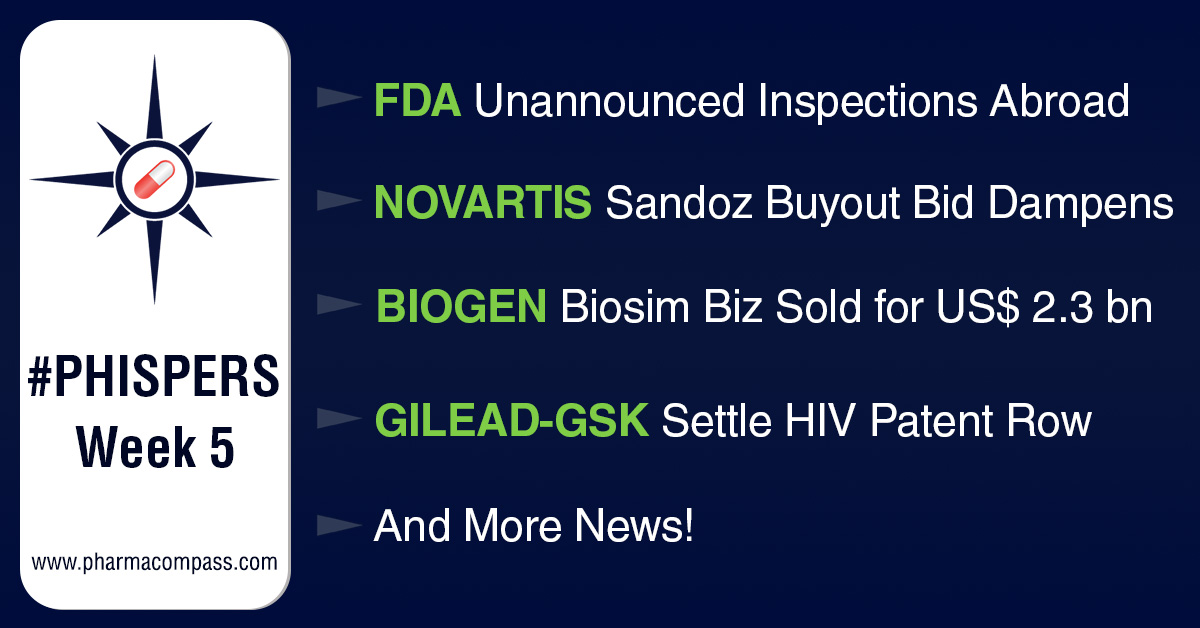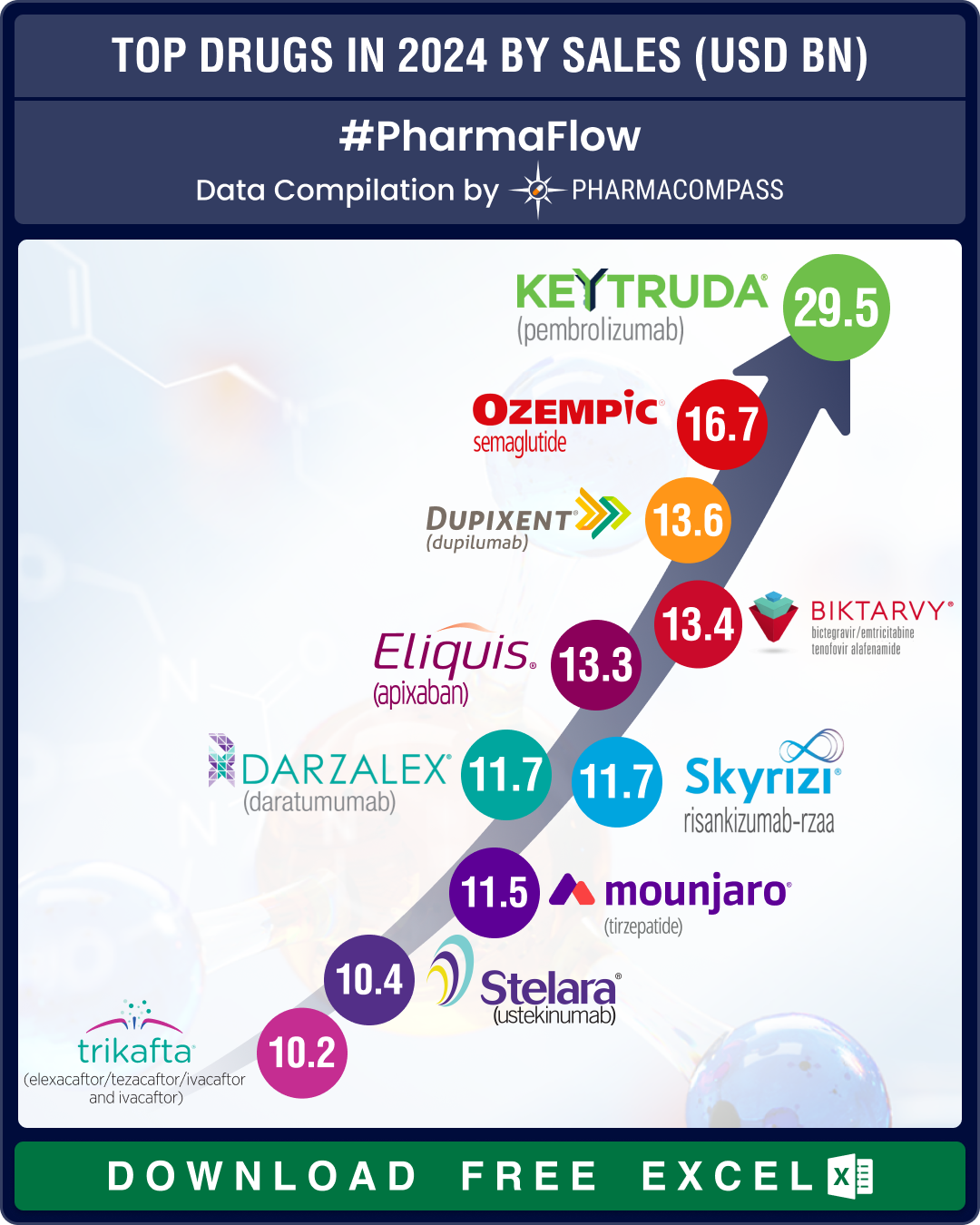
By PharmaCompass
2022-02-03
Impressions: 2321
In this week’s Phispers, there is news that the US Food and Drug Administration (FDA) may no longer provide advance notice of inspections to foreign drug manufacturing facilities if a new bill tabled by the Republicans finds favor among US lawmakers. Since domestic manufacturers in the US are not provided notice of a surveillance inspection, the bill will help correct an anomaly due to which foreign drug facilities get sufficient time to conceal non-compliance at their facilities.
There is also news that private equity firms Blackstone and Carlyle Group are considering a joint offer for Novartis’ Sandoz, which could be valued at around US$ 25 billion. However, Novartis CEO Vaz Narasimhan put a dampener on the prospects of a buyout by terming the outlook for Sandoz as “disappointing.”
Troubled drugmaker Biogen has announced the sale of its stake in Samsung Bioepis to its partner Samsung Biologics for US$ 2.3 billion. Pfizer has decided to discontinue the development of a cardiovascular drug candidate, vupanorsen, and return the rights to Ionis Pharmaceuticals. And Gilead Sciences has agreed to pay US$ 1.25 billion to GSK’s HIV medicines unit, ViiV Healthcare, to settle a patents dispute.
In ophthalmology, FDA has approved Viatris’ generic to AbbVie’s Restasis. This is the first generic to Restasis, a chronic dry eye drug that has been able to evade generics for many years, despite its lapsed patents. The agency also approved Roche’s Vabysmo, a new treatment for wet-age related macular degeneration (AMD). Vabysmo will be up against Regeneron’s blockbuster drug Eylea.
In China, authorities have arrested multiple suspects in connection with a medical insurance fraud scheme run allegedly by some AstraZeneca China employees. And Eli Lilly has announced its plan to invest US$ 1.5 billion to build two new manufacturing plants in the US and Ireland to bolster the production of its diabetes and cancer drugs.
Bill seeks to stop FDA from providing advance inspection notice to foreign drug facilities
If a new bill finds favor among US lawmakers, the US Food and Drug Administration (FDA) will no longer provide advance notice of inspections to foreign drug manufacturing facilities.
The Creating Efficiency in Foreign Inspections Act — introduced by Republican Senators Mike Braun of Indiana and Joni Ernst of Iowa last month — proposes to eliminate FDA’s practice of giving prior notice of foreign surveillance inspections and help even the playing field between foreign and American drug manufacturers.
The FDA has been notifying drug manufacturers located outside of the US weeks or months in advance of any planned surveillance inspection. It, however, does not provide any advance notice to domestic drug manufacturers.
The Senate Committee on Finance recently suggested that the delay between notice and inspection gives some foreign drug facilities sufficient time to conceal non-compliance. This is relevant because most active pharmaceutical ingredients (APIs) used in the US drug industry are manufactured in facilities abroad.
Novartis CEO terms outlook for Sandoz disappointing amid reports of US$ 25 billion bid
This week, Bloomberg News reported that private equity firms Blackstone and Carlyle Group are considering a joint offer for Sandoz, Novartis’ generics unit, which could be valued at around US$ 25 billion. This is the second such report in recent months. In October, German newspaper Handelsblatt had reported that Sweden-based investment group EQT and the Struengmann family of Germany were considering a joint move to purchase Sandoz for US$ 21.6 billion.
Carlyle declined to comment, while Blackstone did not respond to a Reuters request. According to Bloomberg News, Advent International, Hellman & Friedman and KKR & Co are also considering their own approaches.
However, CEO of Novartis, Vas Narasimhan, dampened the prospects of a buyout by revealing that the US sales for Sandoz are expected to continue to go downhill in 2022. Narasimhan said he’ll wrap up his strategic review of Sandoz and make a decision by 2022-end.
While there are no imminent deals in the works, Narasimhan said the company will patiently watch the sector for new bolt-on opportunities.
“We know that given the strong cash flow that we generate at Novartis, we have the ability to continue to do bolt-on acquisitions like we’ve done in the past when we find attractive assets that fit with our therapeutic area goals and our platform goals,” Narasimhan said. Sandoz posted revenues of US$ 9.6 billion in 2021, with net sales down two percent in Europe and 15 percent in the US.
Biogen sells stake in biosimilars business to partner Samsung for US$ 2.3 billion
Samsung Biologics has agreed to shell out US$ 2.3 billion to take over Biogen’s stake in Samsung Bioepis. Biogen will receive US$ 1 billion in cash immediately and another US$ 1.25 billion split over the next two years. The Massachusetts-based biotech will receive another US$ 50 million in commercial milestones.
Samsung Bioepis was set up as a joint venture between Biogen and Samsung in 2012 to develop and manufacture biosimilars. Initially, Biogen had a 15 percent stake. The drugmaker had later invested another US$ 700 million to boost its stake to around 50 percent.
Biogen said it will retain commercial rights to both Byooviz (a biosimilar of Novartis’ eye drug Lucentis) and the investigational candidate SB15 (a biosimilar of Regeneron’s Eylea) along with biosimilars of Enbrel, Humira and Remicade.
After disappointing trial data, Pfizer returns cardiovascular drug to Ionis Pharma
Pfizer’s hope of adding another blockbuster drug to its kitty, with expected peak sales of US$ 3 billion, has gone up in smoke.
In 2019, Pfizer had paid Ionis Pharmaceuticals US$ 250 million upfront for cardiovascular drug vupanorsen and had put the drug at the heart of its growth plan believing it could rack up blockbuster sales. However, after going through phase 2b trial data of vupanorsen, Pfizer has decided to discontinue the drug and return the rights to Ionis.
Although the drug lowered triglycerides (a type of fat in the blood) and cholesterol, the reductions weren’t significant enough to support continued development of vupanorsen, Pfizer said. It also highlighted dose-dependent increases in liver fat and elevated liver enzymes at higher doses as reason behind its decision.
Roche’s R&D chief joins Pfizer: The New York-based drug behemoth has found a new chief of drug development to replace Rod MacKenzie, its clinical leader who’ll retire soon. William Pao, currently the head of Roche’s research and early development and part of the executive committee, will step into MacKenzie’s shoes as chief development officer and executive vice president on March 21, Pfizer announced on Tuesday. He will lead Pfizer’s global product development unit, which includes clinical work for investigational medicines and supporting regulatory work on marketed therapies.
Gilead settles HIV drug patent row with GSK through US$ 1.25 billion payout
GlaxoSmithKline (GSK) and Gilead Sciences have been at loggerheads over lucrative patents pertaining to GSK’s HIV drug dolutegravir since 2018. But in a settlement announced on Tuesday, the two pharma giants have decided to end their long-drawn patent dispute.
Under the settlement, GSK’s HIV medicines unit, ViiV Healthcare, will receive US$ 1.25 billion from the US-based drugmaker in the first quarter of 2022. Gilead will also pay a three percent royalty on its US sales of blockbuster HIV drug Biktarvy — which generated US$ 7.26 billion last year — until 2027.
In 2018, the British drugmaker had alleged that Gilead’s Biktarvy infringed on patents related to ViiV’s dolutegravir. Biktarvy, which combines three HIV medicines in a single daily tablet, poses the biggest challenge to ViiV’s HIV medicines.
China arrests suspects in medical insurance fraud case allegedly run by Astra employees
Chinese authorities have arrested multiple suspects in connection with a medical insurance fraud scheme allegedly run by some AstraZeneca China employees, the country’s National Healthcare Security Administration (NHSA) has said.
The arrests were made after an investigation found evidence that some employees tampered with the genetic testing results of tumor patients in an attempt to defraud medical insurance funds, NHSA said in a statement.
As of Saturday, “all criminal suspects have been arrested,” NHSA announced. It, however, did not share details of the suspected violations or the size of funds involved.
AstraZeneca said an internal probe last year had found that a “small number of employees in Shenzhen had tampered with or participated in tampering with patient test reports.” The drugmaker said it took “serious action” against those employees and reported the situation to the local authorities.
Lilly to invest US$ 1.5 billion to build two new manufacturing plants in US, Ireland
Indianapolis-based Eli Lilly has announced plans of extending its footprints in North Carolina by building a US$ 1 billion manufacturing facility in Concord that will create around 600 jobs with an average salary of over US$ 70,000.
The facility will produce injectable products and medical devices, the company said. The campus, spread over 800,000 square feet, will have five buildings to accommodate its manufacturing facility, along with spaces for logistics and packaging, a quality control lab and a central utilities plant.
The pharma giant is also plowing in over €400 million (US$ 445.3 million) into a new manufacturing facility in Limerick, Ireland. The plant will expand the active pharmaceutical ingredient (API) and monoclonal antibody production and employ more than 300 people. The short-term focus of both these plants will be to bolster diabetes and cancer products but will take on Alzheimer’s and obesity medications in the long run.
FDA approves Viatris’ generic to AbbVie’s chronic dry eye drug Restasis
AbbVie’s controversial chronic dry eye drug — Restasis — finally has competition from a generic. The FDA has approved Viatris’ generic to Restasis, a drug that generated US$ 1.23 billion in US sales for AbbVie last year.
Even though patents on Restasis began expiring in 2014, the drug didn’t have any generics until now. The drug has been embroiled in controversies ever since it was owned by Allergan. In 2017, Allergan had licensed Restasis patents to a native American tribe in a bid to protect the drug from generic competition. The deal had earned the company widespread criticism.
In 2019, Allergen was acquired by AbbVie. According to the FDA Orange Book, Restasis has some patents running through 2024. However, it isn’t clear whether those could block a potential generic launch.
Roche’s newly approved vision drug to compete against Regeneron’s blockbuster Eylea
Regeneron’s blockbuster eye drug Eylea — which generated sales of US$ 8.36 billion in 2020, including US$ 4.95 billion in the US — is up against some serious competition in the coming weeks.
Last week, Roche said the US Food and Drug Administration (FDA) has granted approval to a new treatment for wet-age related macular degeneration (AMD), an eye disorder that can cause blindness in older people. The drug, Vabysmo, has also received approval for diabetic macular edema (DME) — a condition where excess fluid starts to build up in the eyes of a diabetic patient.
The two conditions together affect nearly 1.9 million people in the US and 40 million worldwide. The approval came a week after studies showed that Vabysmo — a bispecific antibody that binds to two proteins instead of one — worked as well as Eylea.
The PharmaCompass Newsletter – Sign Up, Stay Ahead
Feedback, help us to improve. Click here
Image Credit : Phisper Infographic by SCORR MARKETING & PharmaCompass is licensed under CC BY 2.0
“ The article is based on the information available in public and which the author believes to be true. The author is not disseminating any information, which the author believes or knows, is confidential or in conflict with the privacy of any person. The views expressed or information supplied through this article is mere opinion and observation of the author. The author does not intend to defame, insult or, cause loss or damage to anyone, in any manner, through this article.”








